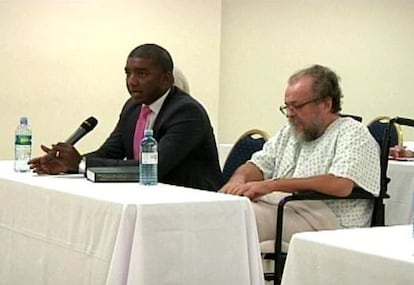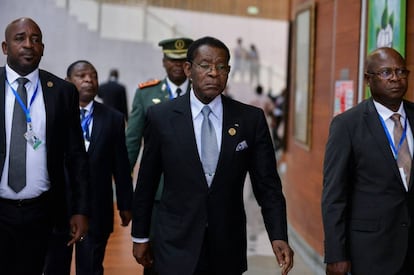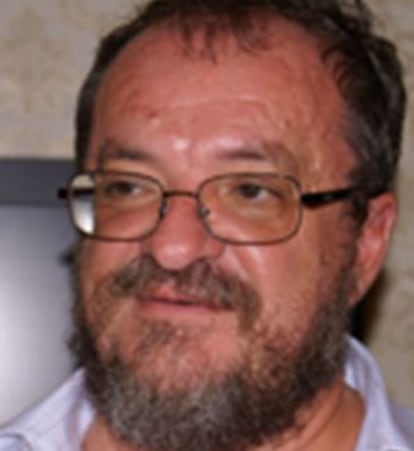How a Russian couple sold €679 million worth of weapons from their Madrid home
The Kokorev family are accused of money laundering for Teodoro Obiang, the longtime dictator of Equatorial Guinea


A married couple living on the upscale Madrid street Pintor Rosales received €120 million from the state coffers of Equatorial Guinea through the sale of weapons, ships and helicopters to the oil-rich West African State, which was formerly a Spanish colony. The cost of the purchases was grossly marked up and the transaction was made with the help of family members and generals of Teodoro Obiang, the longtime dictator of Equatorial Guinea.
Vladimir Kokorev, his wife Julia Maleeva and their children Igor and Vladimir moved €679 million through a giant web of companies in tax havens that concealed the Russian family’s criminal activities for 15 years. That’s according to the 500-page report from Spain’s anti-corruption attorney’s office into the money laundering operation.
The court investigation found that several family members and confidants of Obiang received large amounts of money in illegal commissions from the Kokorevs that had been embezzled from the state coffers of Equatorial Guinea. Fausto Abeso Fumo, Obiang’s son-in-law and the former chief of the Military Cabinet, received €2.7 million; Melchor Esono Edjo, Obiang’s nephew and former treasury secretary of state, got €210,000; Agustin Ndjon Ona Mbuy, his cousin and a general in the armed forces, received €103,000; Hassan Khalil Hashem, presidential defense advisor, obtained €1.2 million and Luciano Esono Bitegue Ate, a former head of the president’s Military Cabinet, €2.3 million. The anti-corruption attorney’s office is calling for an eight-year prison sentence for Vladimir Kokorev and a six-year sentence for his wife Julia and their son Igor. The three, who are alleged to have acted as the frontmen of Obiang, face multiple money laundering charges as well as a €550-million fine.
Vladimir Kokorev, 66, claimed to be a history professor, but people close to him said he used to work for the KGB, the now-defunct security agency of the Soviet Union. His wife, Julia Maleeva, 68, pretended she was a journalist. Igor Kokorev worked as a lawyer for a prestigious law firm in Madrid. No one in their building, located in one of the most exclusive areas in Madrid, had any idea that the Kokorevs were selling military defense equipment, war weapons, remote-controlled rockets, armored vehicles, bombers, combat helicopters and frigates to Equatorial Guinea. Their name was not on the mailbox, which instead was marked as Blue Horizon, a shell company the family used to buy property. The building, which was also home to the Syrian embassy, was patrolled by the Spanish National Police day and night.

The family’s world came crashing down in 2007, when this newspaper published several reports on the €130 million transfers the Kokorevs had received in an account in Las Palmas in Spain’s Gran Canaria. This account belonged to Kalunga Company, a Panamanian business owned by the Kokorevs.
The Pro-Human Rights Association of Spain filed a criminal complaint against the Kokorevs alleging that they were acting as the frontmen of Obiang. The pair made a statement to the anti-corruption attorney’s office and a judge in Las Palmas opened an investigation, but the probe was stalled for years due to lack of interest from police and the courts.
In 2012, during a meeting of French and Spanish public prosecutors on the subject of Teodorin Obiang, the son of the dictator who was facing trial in Paris, the Kokorev name popped up. Mysteriously, just days later, the family fled their €1.7 million home and escaped a police raid. Their influence spread far and wide. One year later, Igor Kokorev had “unofficial access” to a report that Spain’s Drug and Organized Crime Unit had written about the family. Six years later in 2018, Vladimir, Julia and Igor Kokorev were arrested in Panama and extradited to Spain. They have been in pre-trial detention for more than two years. The whereabouts of Vladimir Kokorev, the other son, remain known but it is suspected that he is living in the United States. Authorities are planning to issue a search and arrest warrant for him.
The raid on the family’s house in Pintor Rosales in 2012 turned up a horde of evidence for investigators. On Vladimir’s computers, police found dozens of contracts to buy and sell weapons and military equipment. They also uncovered documents on the true value of the assets, often second-hand, that were sold to Equatorial Guinea. Two fighter bombers were bought for €1.8 million and sold for €25.5 million, a markup of €23 million used to “cover the proceeds agreed to by the military advisor of Obiang Hassan Hashem and Luciano Esono,” according to the text from the anti-corruption attorney’s office.

The evidence found in the 2012 raid and others was used by public prosecutor Luis del Río Montes de Oca and judge Ana Isabel de Vega, who opened the case in Las Palmas, to underpin an investigation that had started a decade earlier. Judiciary police were able to reconstruct 59 transfers that took place between 2005 and 2012 with money from the public treasury of Equatorial Guinea. This money was channeled through a network of companies created by the Kokorevs in Panama and Seychelles, before being passed to Nordea Bank in Denmark and later to Credit Suisse in Switzerland. The total amounted to €679 million. Several emails indicated that Vladimir contacted the president of Equatorial Guinea to address his requests for arms amid the threat of a possible coup.
Property moguls
The public prosecutor maintains that Vladimir Kokorev made €120 million from managing this operation. To launder these earnings, Lithuanian and Russian frontmen were placed at the front of an intricate web of companies, Vladimir himself had created, according to the public prosecutor. One such figurehead was Vladimir Evdokimov, a 56-year-old sentenced for illegally trafficking cruise missiles to China and Iran. The public prosecutor also highlights the important role played by Juan Arencibia, a lawyer and a former partner of the consultancy firm Ernst & Young in Las Palmas, and his sisters Margarita and María Luisa, one of whom was on the payroll of a major shell company used by the Kokorevs. “For the success of the criminal plan [Arencibia] provided his accounts in Switzerland and companies in the Netherlands Antilles,” the 500-page document states.
The family’s home on Pintor Rosales street and the eight other apartments and 107 villas in Madrid, Las Palmas and Tenerife that they were forced to leave were just part of an immense global property network, valued at €91 million. The police investigation has uncovered the jewel in the crown of this network: two apartment buildings in New York City. The first, located on 901 Broadway Street, was bought for €17.6 million, and the second, on 290 Mulberry Street, for €22.3 million. The family also purchased an apartment in Trump Palace Condominiums, at 200 East 69th street, and another one on 85th Street for €5.8 million. The latter was bought by Sandra Herrera Sánchez, the wife of the younger Vladimir, whose whereabouts are unknown.
The Kokorevs also bought property in London, buying two buildings in the heart of the city – one on 113 Jeremy street for €4.5 million and another one on 285 Oxford street for €12.3 million.
In Panama, the couple had an apartment in Mystic Point Towers, which they purchased for €318,000, another apartment in Trump Ocean Club (now known as JW Marriott Panama) for €632,000 and an office in Global Bank Tower for €199,000. In the Dominican Republic, the pair bought a villa in the residential estate Casa de Campo, near Santo Domingo, which cost €2.7 million.
In May, Judge Isabel Vega issued an order to open the trial against Vladimir, Julia and Igor Kokorev, who face charges of money laundering. The conditions imposed by Panama for their extradition to Spain mean they cannot be tried for other crimes. The family’s defense team has denied all charges and called for them to be acquitted.
English version by Melissa Kitson.
Update Notice
By Order dated December 16, 2019, in Preliminary Proceedings 737/2009 issued by the Examining Court No. 5 of Las Palmas de Gran Canaria, Mr. Hassan Hachem was excluded as a suspect, and consequently, there is no ruling against him in the Judgment dated May 19, 2025, of the Summary Procedure 62/2022 of the Provincial Court.
Tu suscripción se está usando en otro dispositivo
¿Quieres añadir otro usuario a tu suscripción?
Si continúas leyendo en este dispositivo, no se podrá leer en el otro.
FlechaTu suscripción se está usando en otro dispositivo y solo puedes acceder a EL PAÍS desde un dispositivo a la vez.
Si quieres compartir tu cuenta, cambia tu suscripción a la modalidad Premium, así podrás añadir otro usuario. Cada uno accederá con su propia cuenta de email, lo que os permitirá personalizar vuestra experiencia en EL PAÍS.
¿Tienes una suscripción de empresa? Accede aquí para contratar más cuentas.
En el caso de no saber quién está usando tu cuenta, te recomendamos cambiar tu contraseña aquí.
Si decides continuar compartiendo tu cuenta, este mensaje se mostrará en tu dispositivo y en el de la otra persona que está usando tu cuenta de forma indefinida, afectando a tu experiencia de lectura. Puedes consultar aquí los términos y condiciones de la suscripción digital.








































